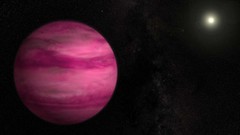As of July 2013, over 800 alien planets have been found orbiting around distant stars. Of these planets, most are what we call ‘Hot Jupiters’. These are enormous, gassy planets that's live very close to their parent stars. You wouldn't want to fly across the galaxy to make a new home on one of these giants; temperatures soar into the 1000s of degrees on their surfaces!
But don't despair, this doesn't mean that our search for alien life and exotic new holiday destinations is over! The reason that so many gigantic, sizzling alien worlds have been found is that they are so easy to discover—at least compared to their smaller, rocky siblings.
Planets beyond our Solar System are called exoplanets, and they are extremely difficult to photograph. It's like to trying to snap a picture of a firefly against the beam of light from a distant lighthouse. So a range of clever tricks have been developed to detect these faint planets without having to see them directly. But now, astronomers from Japan have managed to photograph a new planet, the least massive planet ever caught directly on camera! In size, it's about three times as big as Jupiter, the largest planet in our Solar System.
This new world orbits further from its star than Pluto does from our Sun. This means that it couldn't have been detected using any other technique, since these techniques all need a planet to orbit its host star at least once. And that's a very long wait if the planet lies as far from its star as we do from the Sun, not to mention Pluto! Only by directly snapping a photograph could they find a planet this far from its star.
Cool Fact
If we could travel to this giant planet, we would see a world still glowing from the heat of its formation. Its colour is magenta, like a dark cherry blossom.
Share:














